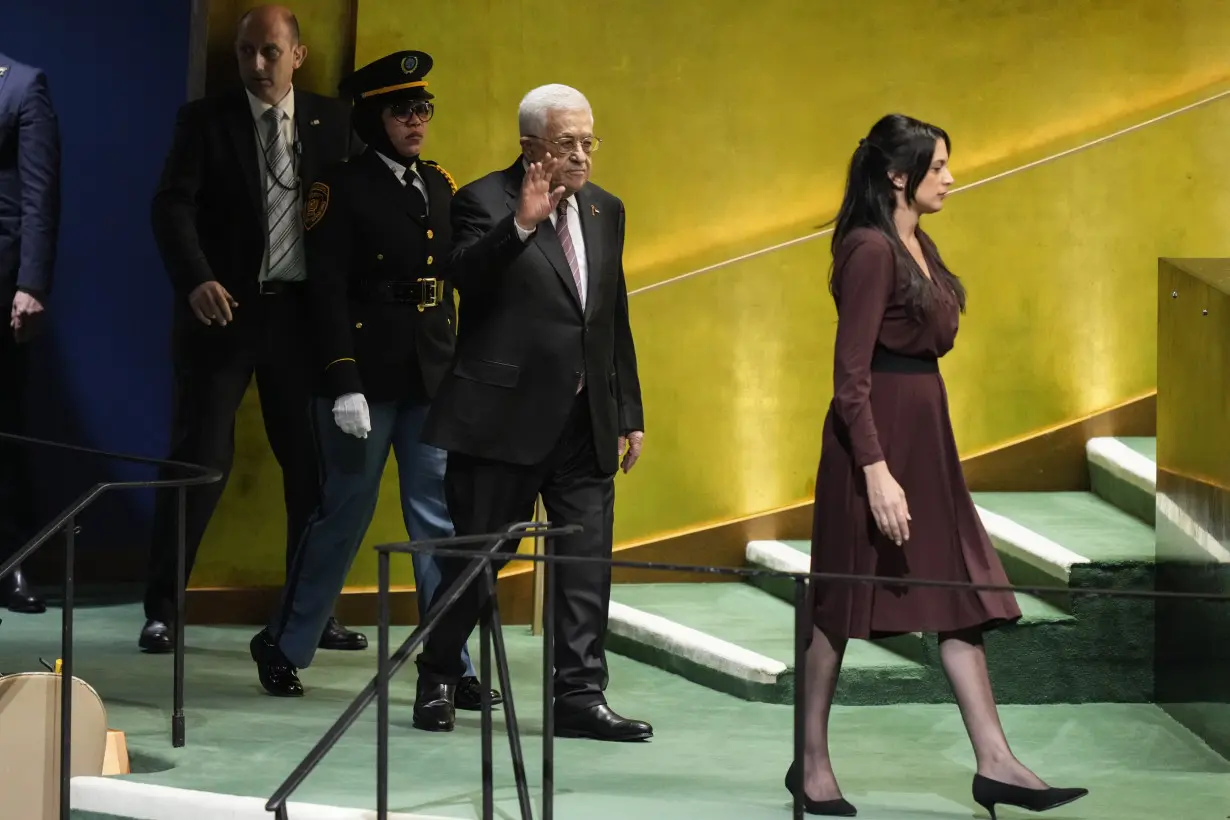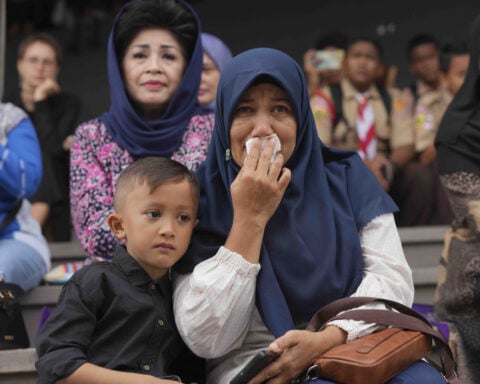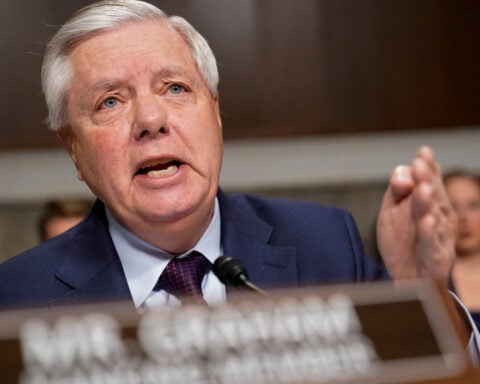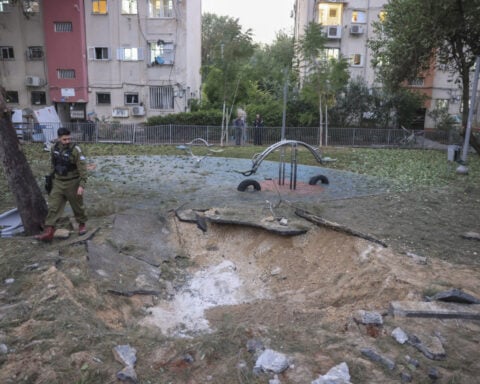NEW YORK (AP) — The head of the Palestinian Authority denounced Israel and its offensive in the Gaza Strip in front of world leaders Thursday, appealing to other nations to stop what he called a “genocidal war” against a place and people he said had been totally destroyed.
Mahmoud Abbas used the rostrum of the U.N. General Assembly as he typically does — to criticize Israel. But this was the first time he did so since the Oct. 7, 2023, attacks by Hamas on Israel that triggered an Israeli military operation that has devastated the Gaza Strip.
Abbas strode to the podium to loud applause and a few unintelligible shouts. His first words were a sentence repeated three times: “We will not leave. We will not leave. We will not leave.”
He accused Israel of destroying Gaza and making it unlivable. And he said that his government should govern post-war Gaza as part of an independent Palestinian state, a vision that Israel’s hardline government rejects.
Abbas has had little influence in Gaza since Hamas overthrew his forces and seized power of the territory in 2007. His internationally recognized government administers only small semi-autonomous zones in the occupied West Bank. The U.S. has said a reformed Palestinian Authority should play a future role in Gaza, but Israel does not consider him a reliable partner and has ruled that out.
“Palestine is our homeland. It is the land of our fathers and our grandfathers. It will remain ours. And if anyone were to leave, it would be the occupying usurpers," he said.
Israel has maintained its military operations are justified and are necessary to defend itself. South Africa has filed a genocide case against Israel in the U.N.’s top court. Israel rejects the accusations.
Danny Danon, Israel's U.N. ambassador, responded to Abbas' speech within minutes with a critical assessment. “Abbas spoke for 26 minutes and did not say the word 'Hamas’ once. Since the massacre of Oct. 7, Abbas has failed to condemn Hamas for their crimes against humanity," he said.
“Only when he stands on the U.N. platform does he talk about a peaceful solution," Danon said. "There is no greater hypocrisy and lie than this: Abbas’ legacy is one of chronic weakness in the face of terrorism and hatred.”
Israeli Prime Minister Benjamin Netanyahu addresses the General Assembly on Friday and arrived in New York shortly before Abbas spoke. Netanyahu's visit is expected to draw protests in the neighborhood where the U.N. compound sits. A nationwide series of campus protests against Israel's operations in Gaza swept the United States in the spring and largely originated at Columbia University, about 70 blocks north of the United Nations.
“The American people are marching in the streets in these demonstrations. We are appreciative of them," Abbas said.
Israel’s campaign in Gaza has killed more than 41,500 Palestinians and wounded more than 96,000 others, according to the latest figures released Thursday by the Health Ministry. The ministry, part of Gaza's Hamas government, doesn’t differentiate between civilians and combatants, but more than half the dead have been women and children, including about 1,300 children under the age of 2.
Israel began its response after Hamas attackers sneaked across the border into Israel on Oct. 7, killing around 1,200 people and taking about 250 others hostage. The response by Netanyahu's government was swift and fierce and has continued ever since.
In recent days, Israel has turned its attention to the border with Lebanon, where it is targeting Hezbollah militants and has inflicted civilian casualties as well.
Hezbollah began attacking Israel almost immediately after the Hamas invasion, and ongoing fighting between Israel and the Lebanese militant group have driven tens of thousands of people from their homes on both sides of the border. Israel is vowing to step up its attacks on Hezbollah until its citizens can return safely to their homes.
Late Wednesday, the United States, France and other allies jointly called for an “immediate” 21-day cease-fire to allow for negotiations as fears grow that the violent escalation in recent days — following 11 months of cross-border exchange of fire — could grow into an all-out war.
The United Nations says over 90,000 people have been displaced by five days of Israeli strikes on Lebanon, bringing the total to 200,000 people who have been displaced in Lebanon since Hezbollah began firing rockets into northern Israel in support of Hamas after it stormed into Israel, sparking the Israel-Hamas war.
Abbas spent big chunks of his speech at the United Nations talking about the state of life in Gaza, and he painted a bleak picture.
"Entire family names have been written out of the civil record," he said. "Gaza is no longer fit for life. Most homes have been destroyed. The same applies for most buildings. ... Roads. Churches. Mosques. Water plants. Electric plants. Sanitation plants. Anyone who has gone to Gaza and known it before would not recognize it anymore.”
Among his demands, none of which are new: A full Israeli withdrawal from the Gaza Strip — not “buffer zones.” Allowing Gaza's displaced Palestinians — an estimated 90% of the population — to return to their homes. And a central role for Abbas' government in any future Gaza.
“Stop this crime. Stop it now. Stop killing children and women. Stop the genocide. Stop sending weapons to Israel. This madness cannot continue. The entire world is responsible for what is happening to our people in Gaza and the West Bank.”
___
See more of AP’s coverage of the U.N. General Assembly at https://apnews.com/hub/united-nations

 How to save a fentanyl victim: Key facts about naloxone
How to save a fentanyl victim: Key facts about naloxone
 Eight convicted in France over murder of teacher who showed Prophet caricature
Eight convicted in France over murder of teacher who showed Prophet caricature
 Death toll from German Christmas market car-ramming rises to four, Bild reports
Death toll from German Christmas market car-ramming rises to four, Bild reports
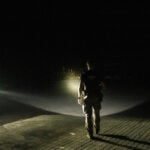 France's Mayotte struggles to recover as cyclone overwhelms hospitals
France's Mayotte struggles to recover as cyclone overwhelms hospitals
 Russia's UK embassy denounces G7 loans to Ukraine as 'fraudulent scheme'
Russia's UK embassy denounces G7 loans to Ukraine as 'fraudulent scheme'
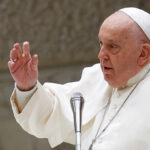 Pope calls Gaza airstrikes 'cruelty' after Israeli minister's criticism
Pope calls Gaza airstrikes 'cruelty' after Israeli minister's criticism
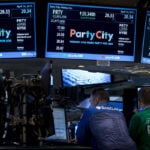 Retailer Party City files for bankruptcy, will wind down 700 stores
Retailer Party City files for bankruptcy, will wind down 700 stores
 Soccer's top players have had enough, as FIFA's new super-sized tournament sparks a revolt
Soccer's top players have had enough, as FIFA's new super-sized tournament sparks a revolt
 Lindsey Vonn finishes 14th in a super-G to mark her return to World Cup skiing at age 40
Lindsey Vonn finishes 14th in a super-G to mark her return to World Cup skiing at age 40
 Santa and Mrs. Claus use military transports to bring Christmas to an Alaska Native village
Santa and Mrs. Claus use military transports to bring Christmas to an Alaska Native village
